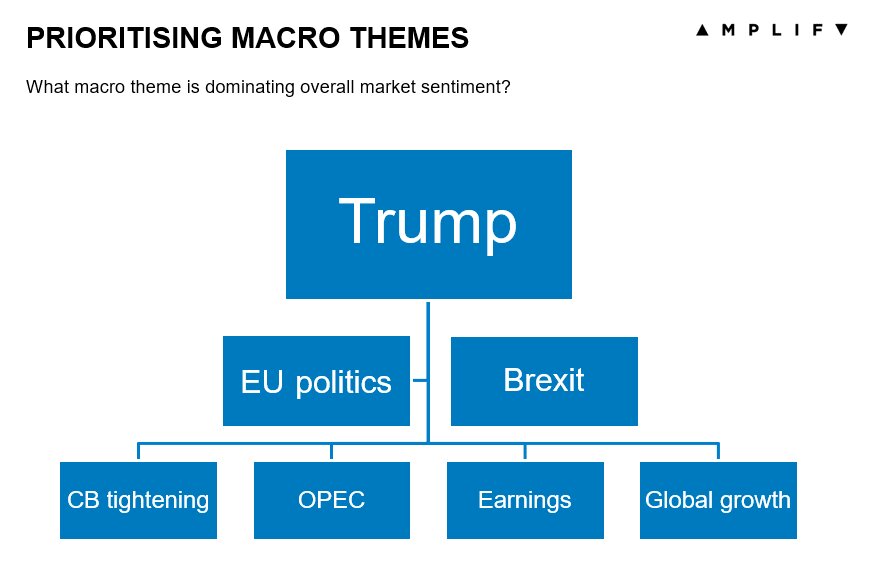How To Interpret The News
02 AUG 2019 | Careers
Amir Khadr - Head of Technology


Head of Market Analysis Anthony Cheung shares his three top tips on how to analyse the news, to help you improve on your fundamental skills...
Given my background in working for one of the world's leading squawk services prior to joining Amplify Trading, the question on 'how to interpret the news' is one I get asked all of the time. Whether it be from a retail trader who only looks at technical analysis, to the students who want to better understand how today's news impacts financial markets.
For me, the reluctance to tackle the news is understandable due to the sheer volume of information out there. However, I have spent a career creating a structured process on how to effectively aggregate news flow.
As such, I thought it best to write this short blog to cover a few basic points to help those interested in improving their fundamental skills.
1: Understanding the focus of the central bank
Central banks are in the business of managing an economy in as smooth and orderly fashion as possible. To achieve this they adopt a strategy known as 'forward guidance'.
This form of communication is based on central bankers using speeches as a platform to guide market participants as to how they are thinking and in how they perceive the economy and events happening in the world. These events would be classified as macro risks, such as the on-going trade war between the US and China or the Brexit negotiations between Britain and Europe.
"In essence, from their speeches we can determine what subjects carry a greater weighting in the Central Banks decision making process and subsequently what stories will be more important for us to monitor"
2: Understanding the state of the economy
As a secondary layer, the close monitoring of economic data points also gives us a clear clue as to what areas of the economy are causing the most stress and as a result may warrant some kind of policy reaction.
A free website where you can not only access historical data but also learn more about what each data represents is www.tradingeconomics.com.
3: Forming a hierarchy of news
Once you have gone through steps one and two you should be in a better position to eliminate a large majority of the irrelevant/non-market moving information.
The aim is that we strategically assign a clear hierarchy to the news stories in play so that we only focus on what really moves markets, thus eliminating the noise.
Given my background in working for one of the world's leading squawk services prior to joining Amplify Trading, the question on 'how to interpret the news' is one I get asked all of the time. Whether it be from a retail trader who only looks at technical analysis, to the students who want to better understand how today's news impacts financial markets.
For me, the reluctance to tackle the news is understandable due to the sheer volume of information out there. However, I have spent a career creating a structured process on how to effectively aggregate news flow.
As such, I thought it best to write this short blog to cover a few basic points to help those interested in improving their fundamental skills.
1: Understanding the focus of the central bank
Central banks are in the business of managing an economy in as smooth and orderly fashion as possible. To achieve this they adopt a strategy known as 'forward guidance'.
This form of communication is based on central bankers using speeches as a platform to guide market participants as to how they are thinking and in how they perceive the economy and events happening in the world. These events would be classified as macro risks, such as the on-going trade war between the US and China or the Brexit negotiations between Britain and Europe.
"In essence, from their speeches we can determine what subjects carry a greater weighting in the Central Banks decision making process and subsequently what stories will be more important for us to monitor"
2: Understanding the state of the economy
As a secondary layer, the close monitoring of economic data points also gives us a clear clue as to what areas of the economy are causing the most stress and as a result may warrant some kind of policy reaction.
A free website where you can not only access historical data but also learn more about what each data represents is www.tradingeconomics.com.
3: Forming a hierarchy of news
Once you have gone through steps one and two you should be in a better position to eliminate a large majority of the irrelevant/non-market moving information.
The aim is that we strategically assign a clear hierarchy to the news stories in play so that we only focus on what really moves markets, thus eliminating the noise.

I would be reviewing this hierarchy weekly on a top-level macro basis but more frequently intraday, as scheduled calendar events (data, speakers, earnings, even technicals) may shift the focus in the short-term.
In Summary
Hopefully these three simple steps will provide you will an introductory framework to making your interpretation of the news more effective. Having been responsible for breaking down complex macro topics into actionable trading strategies for over 14-years this is just the beginning of this subject, so rest assured there is still plenty to learn!
One word of advice I would give to anyone new to trading is that politics now forms a critical part to understanding financial markets due to its impact on economic conditions and expectations. So engaging with politics both domestically and globally has become a necessity.
To continue your development and to access daily insights from the trading desk, subscribe to our YouTube channel, where I deliver a briefing every week day morning on the fundamental factors driving markets.
In Summary
Hopefully these three simple steps will provide you will an introductory framework to making your interpretation of the news more effective. Having been responsible for breaking down complex macro topics into actionable trading strategies for over 14-years this is just the beginning of this subject, so rest assured there is still plenty to learn!
One word of advice I would give to anyone new to trading is that politics now forms a critical part to understanding financial markets due to its impact on economic conditions and expectations. So engaging with politics both domestically and globally has become a necessity.
To continue your development and to access daily insights from the trading desk, subscribe to our YouTube channel, where I deliver a briefing every week day morning on the fundamental factors driving markets.
Good luck with your trading and future development!
Best,
Anthony
Best,
Anthony
The Market Maker daily
e-newsletter and weekly podcast
 99% said it helped them gain better knowledge of markets
99% said it helped them gain better knowledge of markets  70% said it helped them prepare for a job interview
70% said it helped them prepare for a job interview  Top 5% most followed podcasts globally
Top 5% most followed podcasts globally  Top 5% most shared globally in 2022
Top 5% most shared globally in 2022  Listened to in 84 countries world-wide
Listened to in 84 countries world-wide

Useful Links
EMPLOYERS
UNIVERSITIES
Contact
© Amplify Trading LTD (REG NO: 06798566) VAT: GB947568566. Registered England and Wales.
Useful Links
STUDENTS
EMPLOYERS
UNIVERSITIES
Contact
-

Amplify Trading, 18 St Swithlin’s Ln, London EC4N 8AD
-
 +44 (0) 203 372 8415
+44 (0) 203 372 8415
-
 info@amplifyme.com
info@amplifyme.com
© Amplify Trading LTD (REG NO: 06798566) VAT: GB947568566. Registered England and Wales.


